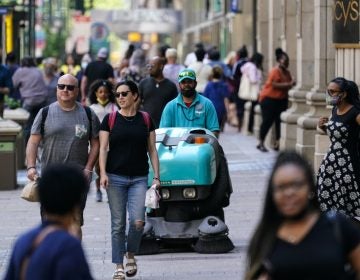Marion Nestle: Food co-ops are key to bringing nutrition to under served communities
Food nutrition scholar Marion Nestle says the co-op model is better equipped to bring good food to underserved communities.
“Everything about food really has to do with social problems and that’s why co-ops are so important,” Nestle said on Saturday in Philadelphia. “[Co-ops] are an alternative to the industrial food system.”
Nestle, A New York University Paulette Goddard professor delivered her remarks at the Consumer Cooperative Management Association’s (CCMA) annual conference held this year at the Philadelphia Downtown Marriott.
Nestle says most grocery stores are run like businesses, meaning they do what is most cost-effective. Unfortunately, she says, that’s driving up prices of healthy foods like fruits and vegetables. It’s a business model that she says takes incentives away from growing fruits and vegetables because stores can make more profit selling junk foods.
“If you look at the underlying causes…of malnutrition and hunger, they all have to do with politics and society,” she said. “We live in a paradoxical, maybe ironic, world these days where equal numbers are hungry and malnourished as those who have so much to eat that they’re obese and developing risk factors for chronic disease.”
Nestle says co-ops help solve this paradigm in three ways—supplying cheaper healthy foods, supporting local farmers and finding systems that make food more accessible and cheaper to everyone. The key is providing a social platform to change the way communities look at food.
Nestle said food co-ops provide that platform because they are inherently local and do things like buy from local farmers and change the way communities think about healthy food.
“People learn how to communicate and how to deal with each other around very local issues,” she said. “The [co-op] members have a say in the business. For those who feel passionate about an issue this is an opportunity…to try to make changes that’ll be helpful for everyone.”
All in all, Nestle said the best way to change the national perspective is to start small, and that’s with cooperatives.
“You have to start someplace, and you start where the people are,” she said. “That’s why this is so powerful.”
Weavers Way general manager Glenn Bergman said he felt bringing Nestle to the conference was a no-brainer.
“Her book talks about what we talked about here today—[the fact that grocery stores] have to make a business with a bottom line, which is profit,” he said. “No matter how much we talk about healthy selections in grocery stores, the grocery store doesn’t care. They have to report that back to Wall Street.”
Shannon Tyman, an attendee of the conference and board member of Central Cooperative in Seattle, Wash., said she’ll be taking what she learned about local activism back to her co-op.
“I think we make more choices and be more careful at the local level because we’re more intimately involved [and] are able to affect more meaningful change,” she said. “I think that puts us in a position to more knowledgeably influence and advocate for what we want to see on a national level.”
WHYY is your source for fact-based, in-depth journalism and information. As a nonprofit organization, we rely on financial support from readers like you. Please give today.




